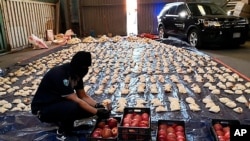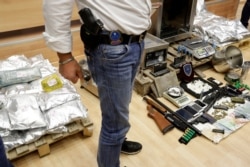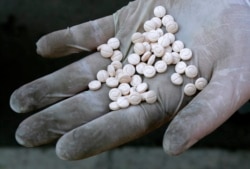Customs officials at the Al-Haditha Port, located near Saudi Arabia's border with Jordan, intercepted last month a consignment of more than 2 million Captagon pills hidden in the hollowed-out lids of jars of tomato paste.
The previous month, they seized 4.5 million pills at the Saudi port of Jeddah. The Captagon, an amphetamine, and one of the most used drugs on the Mideast’s battlefields, was discovered concealed in crates of oranges.
The Saudis are not alone in the region uncovering large amounts of Captagon, the most popular recreational drug in the Mideast and nicknamed by some “the poor man’s cocaine.” Lebanon, too, has been intercepting loads and its security forces have been beefing up their counter-narcotics operations along the country’s coastal and land borders with Syria, the source country, according to security officials and counter-narcotics analysts, of the amphetamine.
Southern European countries have seen a Captagon surge, too. In June 2020, Italian customs officials announced they had seized 84 million tablets of Captagon aboard a ship docked at the southern Italian port of Salerno. They suggested the narcotics were the property of the Islamic State terror group, but that connection has been reassessed by authorities.
In 2018, Greek authorities intercepted a freighter carrying over $100 million worth of cannabis and Captagon. An investigation by the Organized Crime and Corruption Reporting Project, a consortium of investigative journalists, exposed a criminal network behind the shipment allegedly with ties to the Assad family.
Narco-state
“Syria can also lay claim to another ignominious distinction of the so-called new wars: it has become one of the world’s foremost narco-states,” the Center for Operational Analysis and Research, COAR, a Cyprus-based risk and development consultancy. “As the Syrian State has re-consolidated control over much of the country since 2018, narcotics trafficking in Syria has become more expansive and widespread,” it said in a report published earlier this year.
“Syria is the global epicenter of Captagon production, which is now more industrialized, adaptive, and technically sophisticated than ever,” COAR argued. The report detailed how Captagon trafficking had been “among the funding streams utilized by anti-state armed groups,” but said, “consolidation of territorial control has enabled the Assad regime and its key regional allies to cement their role as the prime beneficiaries of the Syrian narcotics trade.”
It warned the Syrian drug trade will have a “destabilizing impact on neighbouring and regional states, which will be forced to bear additional societal and law enforcement burdens as a result.”
Captagon is a brand name for the highly addictive stimulant fenethylline hydrochloride. Government and insurgent armies in the region and Central Asia have often turned to it to get their warriors to fight more ferociously and for longer as it blunts fear, boosts bravado and reduces tiredness.
From the 1990s through the first decade of this century, Captagon amphetamine was largely manufactured in the Balkan countries, mainly Bulgaria. The trade was largely controlled by Bulgarian and Turkish organized crime gangs and the main market for were the countries of the Gulf, as it still is.
However, from 2011 onward, the conflict in the Syrian Arab Republic appears to have had an impact as various factions that were seeking access to funds through involvement in the illicit drug trade had an incentive to become active in the manufacture of ‘captagon,’” according to the Vienna-headquartered United Nations Office on Drugs and Crime in its 2020 annual drug report.
Since 2014, Around 40% of Captagon seized by authorities in the Middle East and South-West Asia is thought to have originated in either Syria or neighboring Lebanon, where Hezbollah, the radical Shi'ite movement and Assad ally, has been accused by Italian law-enforcement among others, of running clandestine Captagon labs, often just over the border in Syrian territory its fighters now control.
Jordanian authorities have reported that all of the amphetamine they have seized was manufactured in either Syria or Lebanon. European and Mideast law-enforcement officials say there are clandestine labs in the Syrian cities of Aleppo and Homs. The 84 million Captagon pills seized in June last year at the port of Salerno — the consignment weighed 14 tones and had a street value of value around $1.2 billion — were hidden paper and steel cylinders that originated in a print plant in Aleppo, according to Italy’s Guardia di Finanza, which led the operation.
At the time of the seizure, Col. Domenico Napolitano of the Guardia di Finanza told local reporters: “Fourteen tons of amphetamine could not have been destined for Italy alone.” He said most were probably destined for the United Arab Emirates and had just been routed through Salerno.
In its report this year, COAR estimated Captagon exports from Syria “reached a market value of at least $3.46 billion.” But it noted: “Though conjectural, a market ceiling significantly higher than this is distinctly possible.”







